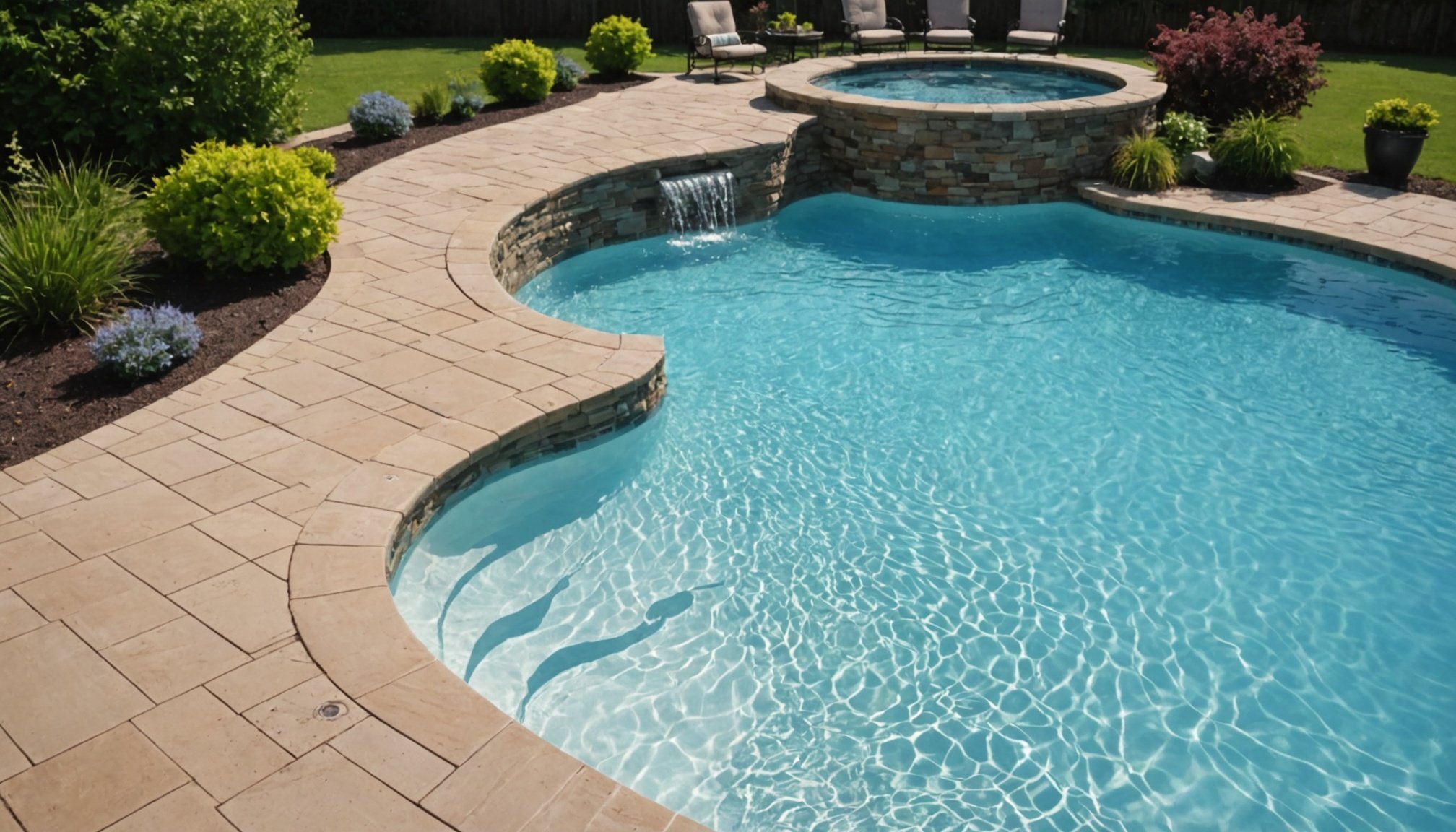Overview of Saltwater Pools and Chlorine Pools
Understanding the differences between saltwater pools and chlorine pools is essential when considering which pool system best fits your backyard oasis.
Saltwater pools operate by using a generator to convert salt into chlorine. This process is achieved using an electrolysis system, which continuously produces chlorine, keeping the pool sanitized without the need for manually adding chlorine. This often results in a gentler swimming experience as it’s less harsh on the skin and eyes compared to traditional chlorinated water. However, these systems require an initial investment in the generator, which may be higher than a basic chlorine setup.
Cela peut vous intéresser : Top Underwater Workout Programs for UK Swim Pool Enthusiasts: Dive into Fitness!
In contrast, chlorine pools require direct chlorination. Owners must consistently add chlorine through tablets, granules, or liquid to maintain the correct chemical balance. Although the initial cost for setting up a chlorine pool is generally lower, recurring expenses might be higher due to regular chlorine purchases and maintenance.
Comparing the initial investment of both, chlorinated pools may seem more cost-effective upfront. However, saltwater systems can lead to savings over time by reducing the need for additional chemicals. Ultimately, the choice between these pool systems hinges on personal preferences regarding maintenance effort, swimmer comfort, and long-term financial considerations.
A lire aussi : Discover the Health and Safety Advantages of Pool Enclosures in the UK
Health Benefits of Saltwater Pools
For individuals keen on skin care, saltwater pools offer compelling advantages. Unlike traditional chlorine pools, the soft and gentle nature of saltwater is known to be skin-friendly, helping to maintain moisture and reducing drying effects commonly associated with chlorine. Those who frequently swim in saltwater pools may notice a softer and more nourished skin texture over time.
Furthermore, these pools present a diminished likelihood of eliciting allergies, particularly beneficial for swimmers who may struggle with sensitivities to harsh chemicals in chlorinated water. The natural saline content acts as a mild antiseptic, which can help in reducing instances of irritation and potentially decrease any flare-ups for those with sensitive skin.
In numerous testimonials, users with skin sensitivities report a significant reduction in allergic reactions when swimming in saltwater pools. These personal accounts underscore the gentle impact of saltwater compared to the sometimes harsh effects of chlorine. Given these factors, transitioning to a saltwater pool could be a wise consideration for anyone prioritising skin health and looking to ease allergy symptoms while enjoying their aquatic activities.
Cost Analysis of Pool Maintenance
Investing in a swimming pool requires a thorough understanding of maintenance costs to ensure it remains a pleasure, not a burden. For saltwater pools, the initial installation can be pricier due to specialised equipment, though ongoing expenses tend to be lower. Maintenance includes the replacement of salt cells every five years, which can be a costly element over time.
In contrast, chlorine pools are more affordable to install initially. However, they incur higher maintenance costs due to regular chemical purchases. Chlorine tablets and balancing agents can add up, affecting homeowners’ budgeting strategies significantly.
When considering long-term savings, saltwater systems often win due to their reduced need for chemical replenishments. Yet, replacement and repair of parts like the chlorinator can negate some benefits. Homeowners should weigh these factors carefully when budgeting for pool maintenance.
The UK’s climate also intensifies the need for regular upkeep. Cooler temperatures can prolong water heating periods, increasing energy bills, while the frequent rain might dilute pool chemicals, leading to additional expenses. Therefore, maintaining a pool in the UK demands a distinct approach, focusing on efficient energy use and robust weather protection solutions to optimise cost-effectiveness over time.
User Experiences and Testimonials
Understanding real-world user experiences can be incredibly valuable when considering a product’s practicality and performance. In the UK, homeowners with saltwater pools have shared numerous testimonials and customer reviews, which paint a comprehensive picture of their experiences.
Several case studies indicate that homeowners appreciate the soft feel of saltwater on their skin, often comparing it favorably against traditional chlorinated pools. One user even noted the lack of irritation in the eyes and nose, which was a significant advantage for their family’s enjoyment.
However, comparisons also highlight some challenges. While the absence of harsh chemicals is a frequently praised attribute, some users mention the need for specialized equipment, such as a salt-chlorine generator, which may incur additional costs. Such equipment can sometimes require more frequent maintenance than anticipated.
User satisfaction ratings consistently reflect that the pros outweigh the cons, with many homeowners expressing contentment with the overall experience. Themes of easy maintenance, long-term cost savings, and enhanced swimming pleasure are commonly echoed.
In testimonials, one key point emerges: the transition to saltwater systems often leads to an overall improved swimming environment. For those considering a switch, these experiences and customer reviews can provide critical insights and expectations management.
Maintenance Tips for Saltwater Pools
Proper maintenance is key to enjoying the benefits of a saltwater pool. Regular pool care includes monitoring the chlorine-generating salt cell. This device converts salt into chlorine, and should be inspected every 90 days for calcium buildup, which can impede its efficiency. Clean the cell according to the manufacturer’s instructions to prolong its lifespan.
Routine checks of the pool’s pH and salt levels are essential. Aim for a pH level between 7.2 and 7.6, and ensure salt concentrations remain within the 2700 to 3400 ppm range. Use a saltwater test kit regularly to keep these levels steady, ensuring optimal pool care.
Common issues with saltwater pools include pH imbalance and algae growth. If the pH is too high, add muriatic acid. Should algae appear, shock the pool with chlorine and scrub affected areas.
Comparing maintenance between saltwater and chlorine pools, the former requires fewer chemicals and has softer water, which is gentle on skin and eyes. However, careful routine checks are paramount to avoid more significant issues down the line. With these maintenance tips, you can enjoy a clear and refreshing saltwater swimming experience.
Environmental Impact of Saltwater Pools
Saltwater pools offer several environmental benefits compared to traditional chlorine pools. Let’s delve into these advantages to better understand how they contribute to a more sustainable and eco-friendly pool solution.
Firstly, saltwater pools use electrolysis to produce chlorine from salt, which reduces the need for additional chemicals. This eco-friendly process not only lowers the chemical exposure for swimmers but also minimizes the potential for chemical pollution. Such reduced dependence on harsh chemicals like chlorine tablets and shock treatments significantly lessens the environmental footprint of maintaining a pool.
In terms of sustainability, saltwater pools require less frequent chemical balancing and maintenance, which translates into fewer chemicals being introduced into the environment. This decreased dependence on synthetic chemicals means less chemical runoff into the surrounding ecosystem, protecting local waterways and wildlife. Additionally, saltwater systems typically have a longer life cycle, meaning fewer resources are consumed in their production and maintenance.
Furthermore, environmental benefits extend to air quality around the pool area. With less chemical evaporation, the surrounding air remains fresher and healthier. By choosing a saltwater system, pool owners can take a conscious step towards a more sustainable and greener lifestyle.
Potential Disadvantages of Saltwater Pools
Saltwater pools are often considered a luxurious addition, but several disadvantages and challenges should be considered. A common misconception is that they require significantly less maintenance than traditional pools. While saltwater systems do manage chlorine levels, regular check-ups are needed to ensure the system is balanced.
A primary concern is corrosion. The salt used for electrolysis can accelerate wear on equipment and pool fixtures, especially metals such as ladders and railings. This can result in more frequent replacements or repairs, impacting both time and cost. Using corrosion-resistant materials and sacrificial anodes can help mitigate these effects but may increase initial setup costs.
Another challenge is the limited availability of repair services and parts within the UK. Unlike traditional pool systems, saltwater pools may require specific knowledge and components not always readily available. This can lead to delays in servicing and increased expenses unless you locate a knowledgeable technician locally.
Lastly, converting from a traditional pool to saltwater can involve substantial upfront costs. It’s essential to weigh these limitations and drawbacks against the benefits to make an informed decision. Understanding the full picture helps ensure satisfaction and long-term enjoyment of your pool investment.











